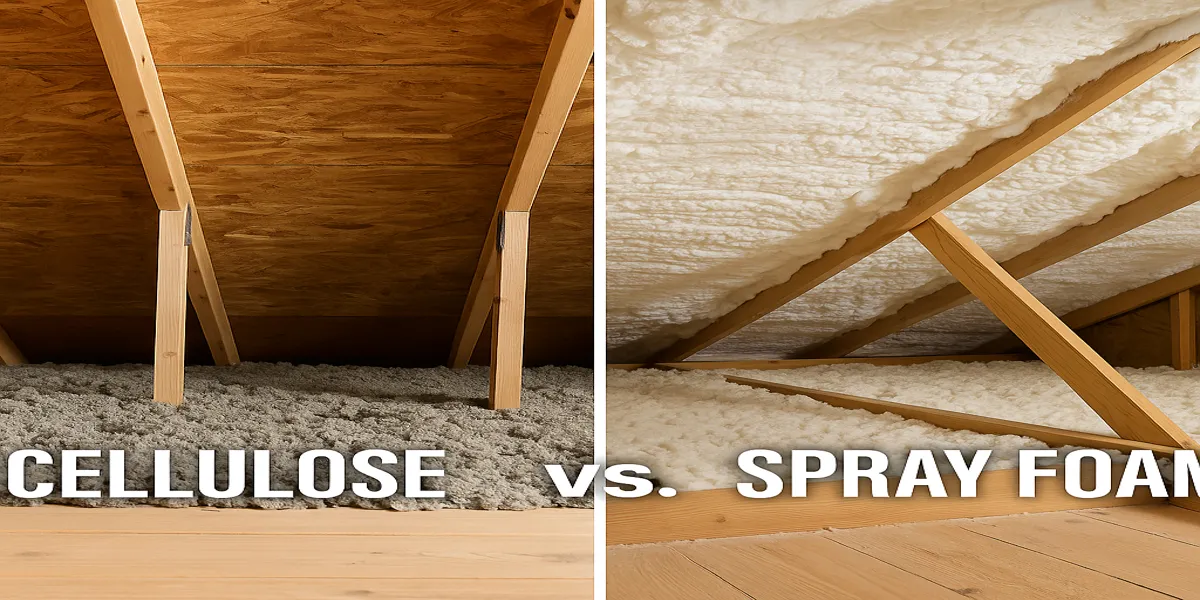When it comes to insulating your attic, homeowners in Northern Virginia face a big decision: which material should you trust to keep your home comfortable and energy efficient? Spray foam and cellulose are two of the most popular options, but they work in very different ways. Knowing the differences can help you choose the insulation that makes sense for your budget, your goals, and the unique climate challenges of our region.
Understanding the Basics
Cellulose insulation has been around for decades. It's made primarily from recycled paper that's treated with fire-resistant chemicals. Installers blow it into attic cavities to create a thick, blanket-like layer. Spray foam, on the other hand, is a newer technology. It's applied as a liquid that expands into every crack and crevice, creating an airtight seal in addition to resisting heat flow.
Both aim to keep your home warmer in the winter and cooler in the summer. But the way they perform day after day can be quite different.
Performance and Energy Savings
Cellulose slows the transfer of heat through the attic floor, but it doesn't stop air from leaking through gaps, wiring holes, or recessed lights. That's why some rooms may still feel drafty even after a cellulose installation. Spray foam excels here: because it expands, it not only insulates but also seals those air leaks. This airtight barrier means your HVAC system doesn't have to work as hard, often leading to noticeably lower energy bills.
Many homeowners who switch to spray foam report that their homes feel more consistent in temperature, with fewer hot and cold spots. The performance difference is especially clear in older homes where attics were never tightly sealed.
Moisture and Air Quality
Northern Virginia's mix of humid summers and chilly winters creates the perfect conditions for moisture problems. Cellulose, while effective at resisting heat flow, can absorb moisture if air leaks allow humidity into the attic. Over time, damp cellulose may settle or even support mold growth. Spray foam resists moisture, which helps prevent condensation and mold issues.
Better air quality is another benefit of spray foam. By sealing out outdoor air, it reduces the amount of dust, pollen, and pollutants that can sneak in through attic leaks. Families dealing with allergies often notice the difference quickly.
Longevity and Maintenance
Cellulose is affordable upfront, but it can settle and compact over time, reducing its effectiveness. That often means topping it off or replacing it after a couple of decades. Spray foam, once installed correctly, tends to last for the life of the home without losing its insulating power. The durability is part of the reason more homeowners see it as an investment rather than a short-term fix.
Cost Considerations
There's no denying that spray foam costs more initially than cellulose. For homeowners working with a tight budget, cellulose may feel like the safer choice. But the long-term picture tells a different story. Spray foam often delivers lower monthly energy bills, fewer HVAC repairs, and a longer lifespan. Over time, many homeowners find that spray foam pays for itself, especially in climates with extreme temperature swings like ours.
Which Should You Choose?
If you're planning a short-term stay in your home and simply want an affordable boost to comfort, cellulose can make sense. It's cost-effective, quick to install, and does the job in many cases. But if you want the most effective, long-lasting solution for your attic — one that addresses air leaks, moisture, and energy costs — spray foam is the clear winner.
The best approach is to consult with a professional insulation contractor who can inspect your attic and recommend the right solution for your specific situation. Every home is different, and expert guidance ensures you get the performance you're paying for.
How DMV Foam Can Help You Decide
At DMV Foam, we've helped countless Northern Virginia homeowners navigate this exact decision. We understand that every home is unique, which is why we start with a thorough evaluation of your current attic insulation and energy performance.
Our team specializes in spray foam solutions that deliver superior air sealing, moisture resistance, and long-term energy savings. We'll help you understand the true cost-benefit analysis for your specific situation and ensure your investment delivers maximum comfort and efficiency.
Your attic is one of the most important areas to insulate if you want a comfortable, efficient home. While cellulose offers a lower upfront cost, spray foam delivers superior performance, moisture resistance, and long-term savings.
Investing in the right attic insulation isn't just about today's comfort — it's about protecting your home and lowering your energy bills for years to come. If you're ready to make your attic work harder for you, spray foam may be the game-changer you've been looking for.
Ready to Choose the Right Attic Insulation?
Get a free attic evaluation and discover which insulation solution is best for your Northern Virginia home.
Schedule Your Free Evaluation